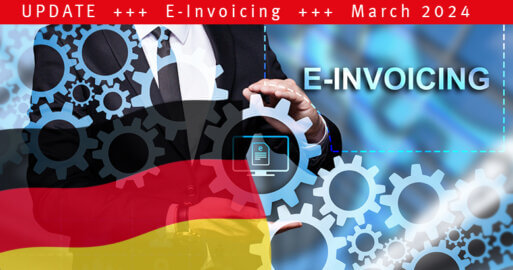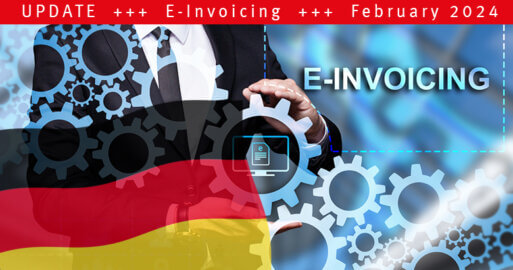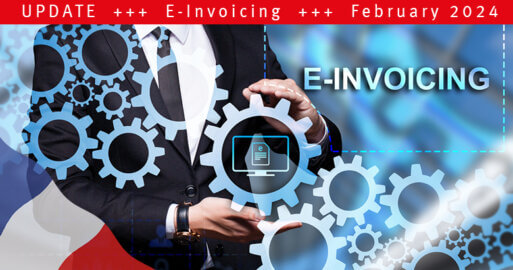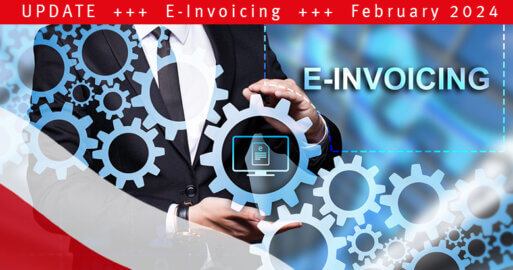New deadlines for the B2G e-Invoicing Mandate in Portugal!

Electronic invoicing in public administration, known as B2G e-invoicing, will become mandatory in Portugal from January 2021 and is similar to existing models in other European countries. The coordinating body for the implementation of e-invoicing in Portugal is eSPAP (Entidade de Serviços Partilhados da Administração Pública).
In Portugal UBL 2.1 ‘CIUS-PT’ and CEFACT ‘CIUS-PT’ are accepted and required as format for electronic signed invoices to public administrations.
For an update on e-invoicing in Portugal, check out the blog article Further Changes to e-Invoicing Mandate in Portugal – Update from July 2021!
Portugal imposes B2G e-invoicing from January 1st 2021 and January 1st 2022
EU Directive 2014/55 adopted in 2014 requires the EU-wide introduction of electronic invoicing in the public sector by April 2019, making e-invoicing for business-to-government (B2G) mandatory throughout the EU from 18 April 2019. Portugal was one of the few countries to meet this deadline.
The initial legislative decree regulating the electronic invoicing system was already adopted on 31 August 2017. This initial decree has since been amended by Decree 123/2018 published on 28 December 2018. The latter regulates the practical application of the regulation on electronic invoicing and defines the new conditions of commitments.
Given the complexity of the application of e-invoicing for public contracts, which is particularly compounded amidst the current pandemic (corona virus), the potential impact on contracting parties is to be reduced and the obligation to submit electronic invoices extended.
The deadlines for the B2G e-invoicing mandate are as follows:
- Since 18 April 2019, the Portuguese public administration is obliged to be able to receive electronic invoices.
- From 18 April 2020, local administrations must also be able to receive electronic invoices.
- From 18 April 2020, all suppliers (large companies) will be obliged to issue only electronic invoices to public purchasers.
- From 31 December 2020, this obligation will apply to all businesses, including SMEs.
- Instead of 18 April 2020, all suppliers of large companies are now obliged from 1 January 2021 to issue only electronic invoices to public authorities.
- From 1 July 2021, the obligation will apply to small and medium-sized enterprises (SMEs).
- For micro-enterprises the obligation will apply from 1 January 2022.
- These above obligations have been postponed due to the Corona virus.
How is the invoice data transferred?
- The eSPAP (Entidade de Serviços Partilhados da Administração Pública) acts as the central coordinating body and is responsible for receiving and sending electronic invoices and accompanying documents between suppliers and contracting authorities in accordance with the European Standard (EN).
- The eSPAP coordination centre accepts electronically signed invoices according to EN 16931-1, i.e. UBL 2.1 ‘CIUS-PT’ and CEFACT ‘CIUS-PT’.
- According to Portuguese law, qualified electronic signatures (EDI basis) with an exchange agreement based on the European Commission Recommendation of 1994 can be used to ensure a reliable audit trail between invoice and delivery.
- Until 31 December 2020, advanced electronic signatures may also be used.
- Since 1 January 2020, electronic invoices (and national transport documents) must also have a QR barcode and a unique document code.
Which public institutions need to work with eSPAP?
The central platform eSPAP is basically ready to receive electronic invoices, but not all authorities are connected yet. The process of connecting to eSPAP is still underway.
The use of the central B2G platform eSPAP applies to:
- contracting authorities (direct government administration and public bodies),
- Issuer of electronic accounts for public tenders, and
- Information intermediaries offering electronic invoice exchange and accompanying documents for public tenders
The Presidium of the Republic, the Assembly of the Republic, the Prosecutor General of the Republic, the courts, independent administrative units, etc. are voluntary public bodies and can work with eSPAP on a voluntary basis.
Can B2B invoices also be transferred?
The eSPAP coordination centre does not currently offer the possibility of receiving B2B electronic invoices.
There is currently no proposal from the Ministry of Economy, Entrepreneurship and Trade to make e-invoicing mandatory for B2B. However, developments in other countries give reason to believe that it is only a matter of time before B2B invoices are also linked to a tax return.
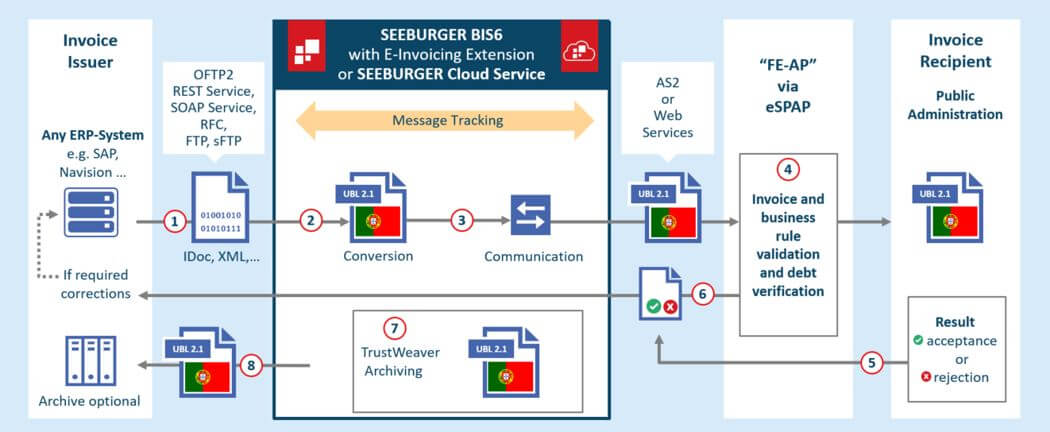
How can SEEBURGER support?
SEEBURGER offers a ‘plug and play’ cloud service for the e-invoicing requirements of Portugal (as shown in Figure 1), where invoice data can be easily transferred in a standard format. The e-invoicing service offered is independent of the ERP system and includes the legally required archiving including any signatures. It should be noted that in Portugal invoices must be stored for 10 years by both the issuer and the recipient.
Conclusion
Despite increasing standardisation, the topic of e-invoicing is, and remains complex. The technical specifications vary greatly in the various countries and are also developing at different speeds. For this reason it makes sense for companies to choose a cloud partner for their e-invoicing projects who has comprehensive knowledge of country-specific requirements and can address them from a single source. The alternative is for companies to implement and operate e-invoicing themselves, or to rely on individual local country-specific providers. In the latter case however, larger, cross-border companies must manage the providers individually.
Other important requirements for an e-invoicing solution are:
- the solution should support the Peppol standard, and if necessary, other formats
- the solution should be easily and reliably connectable to the respective ERP system containing the invoice data
With SEEBURGER Cloud E-Invoicing Services you can quickly and easily send EU-compliant invoices to public authorities and other partners in Portugal. The UBL 2.1 format is recommended, as the CII format is probably not supported for an extension into the B2B area and with UBL a standard can be used for both ways.
If you have any further questions about e-invoicing, we have compiled what you should know about e-invoicing in a clearly structured guide.
Thank you for your message
We appreciate your interest in SEEBURGER
Get in contact with us:
Please enter details about your project in the message section so we can direct your inquiry to the right consultant.
Written by: Andreas Killinger
Andreas Killinger joined SEEBURGER in 2014 and is a product manager, responsible for EDI services and software applications. He specialises in SAP solutions, as well as electronic invoicing (e-invoicing) for globally active customers. Following an apprenticeship as an industrial mechanic and a degree in law and administration, he had various roles in the public sector. He then worked for IBM as an SAP Senior Consultant and SAP Project Manager in international SAP projects from 1999 to 2013.

